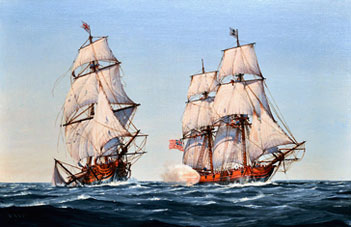The American Revolution, cont.
Many mainland colonists had less sympathy for whaling merchants and seamen who tried to pursue their occupations during wartime. Not long after the battles of Lexington and Concord, a Yankee vessel sailed into Nantucket Harbor and sent more than one hundred soldiers ashore. The soldiers were looking for stores of flour that they believed had been left on the island for a British commander. When their search revealed no flour, the soldier took fifty whaleboats, those boats that hung from whaleships and were lowered into the water to chase and harpoon whales. The seaworthiness of these boats, designed to sneak up on whales in rough seas, also made them valuable during wartime. They were used to ferry colonial troops and deliver surprise attacks on British ships.
For a while, Nantucket whale merchants tried to nurture trade with the West Indies. They loaded vessels with oil, candles, fish and lumber and hoped to return home with cargoes of salt and molasses. British authorities soon suspected that Nantucketers were supplying colonists with supplies from the West Indies. In April 1779, colonial loyalists to the King raided Nantucket. They arrived in seven vessels armed with cannons and looted stores and warehouses. In all, they stole $50,000 worth of goods, including two hundred sixty casks of sperm oil and hundreds of pounds of whalebone.

Wikimedia Commons